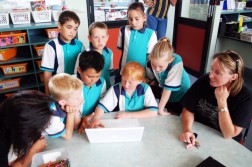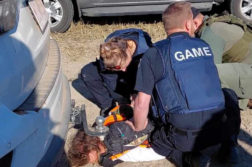According to documents made available to medical students within the School of Medicine at the University of Queensland this semester, students will be allowed to set a certain portion of their own questions during the examinations for the second half of the year.
A study is being done into the stress levels of medical students and how they perform when confronted with various forms of assessment. The news is curiously available for public consumption at the School of Medicine website, an indication of that department’s sheer naiveté or ignorance. This voodoo exam-setting method is described in the project titled Enhancing Ownership of Assessment: Medical Students Generating Questions for their own Final Examination.
The aims of this grant (a UQ Teaching and Learning Strategic Grant) are to "improve students’ problem-solving and comprehension-monitoring abilities as well as reduce their anxiety about assessment". To further this aim, students will contribute to "a bank of potential examination questions which will be available for revision and formative assessment in the weeks leading up to the final examination". This "bank" will contribute some 25 per cent of the final examination questions for students in both first and second year.
This, in a system where knowledge is ownership and the proletarian owners of it are the students. Some sense of this rationale is gathered in a lecture given to the students were by Tracey Papinczak, Senior Evaluation Officer within the School of Medicine in late April. She is one of those named on this particular grant. Self-regulation in education is discussed, along with various learning taxonomies. Self-direction or self-regulation (are students neo-liberal agents?) allows "students to identify how well they are covering the most important aspects of the subject material". To aid this, "exemplar" answers will be provided.
Would patients like their prospective doctors to set their own questions, with answers fully available prior to examination? Examinations, notably rigorous ones, are supposedly set by the wise, the learned, the educated. Ownership of knowledge is impossible to assume if you don’t have it. Pupils and teachers should ideally engage in a dialectic of learning and disputation. But the medical school at the University of Queensland, demonstrating long strides of innovation befitting a Universitas 21 member, prefers a different approach.
The School of Medicine might argue this: there is a "quality control" mechanism in place; students are not being given an arbitrary hand in setting questions. The questions are screened. To refer back to Papinczak’s lecture, "Poor quality ones will be returned to the group for a second try (weeks 28-29)". Appropriate questions will be uploaded to a central examination database available to all students. Patients are bound to feel reassured.
Students will finally be given a questionnaire prior to the examination to test their anxiety levels. The language resembles the most dire form of couch therapy: "Often I lie awake worrying about work that I think I won’t be able to do". Answer options on the form range from "strongly disagree" to "strongly agree". Other questions: "I seem to panic if I get behind my work"; "I often feel anxious about whether I’ll ever be able to cope with the workload". Anxiety is then "rated" on a 1 to 10 scale.
A few guesses can be made about the prospective findings. The figures may well show that students who set 25 per cent of their questions, with answers in advance, readily available on the net, will suffer less stress than those who don’t. How wonderful it is to conduct research on a project when the answers are already certain.
This delusional nonsense is patterned on the self-directed programs that have gradually moved into medical school syllabi over the years. Students are no longer the taught – they will do the teaching and conduct the instruction. Modern medical students are there to be pampered and promoted. Let’s just get them to mark their own questions in future as well, shall we?
Donate To New Matilda
New Matilda is a small, independent media outlet. We survive through reader contributions, and never losing a lawsuit. If you got something from this article, giving something back helps us to continue speaking truth to power. Every little bit counts.



